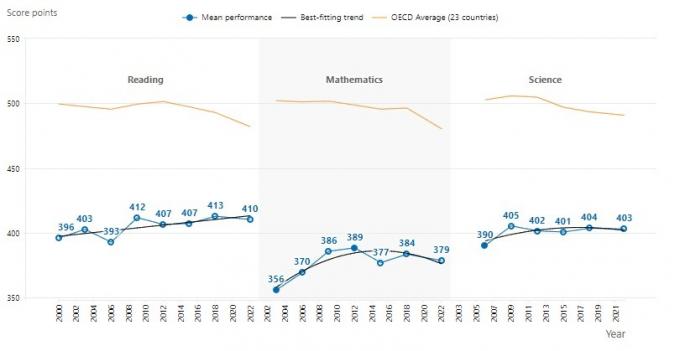O Full-Time School Program was instituted this Monday, July 31, by means of a law sanctioned by the President of the Republic, Luiz Inacio Lula da Silva.
According to Camilo Santana, Minister of Education, the program will serve children and young people, from kindergarten to high school.
Here's a summary of the initiative:
The program has a goal of increase the number of enrollments by 1 million full-time in basic education in the country;
The increase in enrollments is expected for the years 2023 and 2024;
Investment of BRL 4 billion to support states, municipalities and the Federal District;
Target of 3.2 million enrollments by 2026.
Full-time enrollment is defined as that in which student stays in school or school activities for at least 7 hours a day or 35 hours a week, in two shifts.
The program is coordinated by the Basic Education Secretariat of the Ministry of Education (MEC). The project involves the development of technical assistance actions for school departments and communities so that they can qualify the pedagogical work of education in an integral perspective.
"The full-time school is not just to increase the workload, but to welcome people, students. It is to give opportunity and value the teacher."
Camilo Santana, Minister of Education
Read too: What is New Middle School?
full-time education
According to Ana Paula Pereira, CEO of Instituto Sonho Grande, full-time education accompanied by a comprehensive curriculum has the "potential to improve the reality of students".
In this teaching model, the specialist comments that the extension of the school day is applied along with the development of an innovative pedagogical model articulated based on the life project and protagonism of young people.
"This results in a development of the student in its entirety, covering cognitive and socio-emotional aspects, which in addition to improving learning, they contribute to the formation of citizens prepared to deal with the new challenges of the world."
Ana Paula Pereira, CEO of Instituto Sonho Grande
Ana Paula mentions that in the last Basic Education Development Index (Ideb), the learning outcomes of full-time students were, on average, 50% higher than those of regular education peers.

Credit: Disclosure.
A study carried out in Pernambuco points to a reduction of up to 40% in homicide rates among young people after the implementation of comprehensive schools in Pernambuco cities. Given this, Ana believes that comprehensive education is capable of contributing to solving social challenges such as violence.
Implementation of the Full Time School Program
Given the size of the country, Ana Paula believes that for the implementation of the Escola em Tempo Integral Program it is "essential for the states to plan and organize for the execution of the model."
In this process of applying the initiative, Ana highlights two points:
Infrastructure and resources
In order to offer comprehensive education, it is necessary to guarantee a adequate infrastructure that will be able to support the expansion of school hours, as well as changes in the curriculum, argues Ana.
Despite this, Ana Paula mentions the fact that schools with different profiles, with greater and lesser investment capacity, have advanced with the model.
Teacher training
With the innovations and pedagogical changes, the expert highlights the need for adequate teacher training to work in comprehensive education.
These professionals need to learn to teach life project classes, to act as tutors (es in the protagonism clubs, but also to deal with the academic, emotional and social aspects of students.
The challenges exist but they can be overcome with priority and encouragement from the government, reinforces Ana Paula.
Do not stop now... There's more after the publicity ;)
Why study full-time?
For this questioning, Ana Paula emphasizes the question that the model provides an innovative curriculum, focusing on the life project and protagonism of the young person.
"In integral education, students are encouraged to make decisions, discover what they want to do, plan for the future and share responsibilities with other colleagues, allowing the construction of a more participatory learning environment and enriching. As a result, students are better prepared for the world of work and for entering higher education. Integral education prepares for life."
Ana Paula Pereira, CEO of Instituto Sonho Grande
Full-time education and inequalities
Analysis of the results of the last Ideb show that even in schools with a greater number of students in social vulnerability, the integral teaching model has shown positive results.
Ana Paula also mentions that there are data that prove that integral education has the potential to close the wage gap of black graduates and whites, improve the insertion of women in the labor market and contribute to greater access of black and indigenous people to higher education public.
The CEO of Instituto Sonho Grande explains that the organization, which has a partnership with 20 states, focusing on full-time secondary education, performs annual surveys to map challenges, opportunities, good practices and the quality of execution of this teaching model.
know more: All about the Quota Law
Image credit:
[1] José Cruz / Agência Brasil
By Lucas Afonso
Journalist


